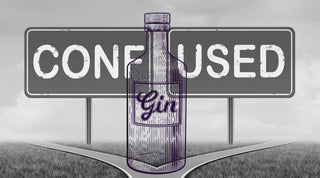Gin is a fascinating, versatile spirit that has captured the imaginations of connoisseurs and casual drinkers alike. Here, we’ve answered some of the most common questions about gin to enhance your experience with this botanical wonder.
What is gin made from?
Gin is distilled from neutral spirits but must include juniper berries as a primary botanical. What sets gin apart is the variety of additional botanicals—ranging from citrus peels to herbs, spices, and flowers—giving each gin its unique flavor profile.
What is gin?
Gin is a distilled alcoholic beverage that derives its predominant flavor from juniper berries (Juniperus communis). From classic to contemporary styles, gin is celebrated for its botanical versatility, allowing for a wide range of flavor profiles.
How is gin different from vodka?
Both gin and vodka begin as neutral spirits, but the inclusion of juniper and other botanicals makes gin unique. Vodka tends to be flavor-neutral, while gin is all about complexity and aroma, especially with brands like Conniption that focus on a balance of botanicals. Gin is the original naturally-flavored vodka.
How is gin traditionally distilled?
Traditional gin distillation involves redistilling neutral grain alcohol with botanicals, with juniper berries as the primary flavor. This process can vary, from steeping the botanicals in the alcohol before distillation, to passing the alcohol vapor through the botanicals.
What is compound gin?
Similar to macerated gin, compound gin sees its botanicals, including juniper, imparted through maceration rather than distillation. However, the main difference is that the liquid is not redistilled. It’s also known as “Bathtub Gin.”
What is macerated gin?
Macerated gin involves first infusing the base spirit with botanicals allowing the flavors to impart directly into the liquid and then redistilling.
What is vapor infused gin?
In vapor infusion, botanicals are placed in a basket (or in the case of Conniption Gin, a custom vapor tray) and through which the alcohol vapor passes during distillation, capturing the essence and flavors of the botanicals more delicately.
What is cold distillation?
Cold distillation uses low temperatures in a vacuum to distill the gin or its botanicals, preserving the delicate botanical flavors that might be destroyed by heat in traditional distillation processes.
How should I drink gin?
Gin can be enjoyed in many forms, but it shines in classic cocktails like the gin and tonic or martini. Conniption Gin’s distinctive distillation process results in a smooth, flavorful gin that holds up in both traditional cocktails and modern twists.
What’s the best way to store gin?
To preserve its freshness, gin should be stored in a cool, dark place. Unlike wine, gin does not age in the bottle, so it retains its flavor indefinitely, though it’s best enjoyed within a couple of years of opening.
Is all gin the same?
Not at all! Gin comes in various styles, from the juniper-forward London Dry to the more contemporary, balanced gins like Conniption American Dry. Each style offers different flavor notes, making gin one of the most versatile spirits in the world.
Why do some people not like gin?
Gin’s bold juniper-forward flavor isn’t for everyone, but modern gins like Conniption are crafted to be more balanced and approachable. If you’ve had a bad experience with gin in the past, it might be time to try a fresh, innovative brand like Conniption.
Why is gin intimidating?
Gin can often seem intimidating to those new to the world of spirits for several reasons. Firstly, its flavor profile, led by juniper berries, can be complex and distinct, differing significantly from the neutral taste of vodka or the sweet familiarity of rum. This complexity, while cherished by enthusiasts, can be challenging for newcomers to navigate.
Additionally, gin's rich history and the plethora of styles, from London Dry to Navy Strength and beyond, contribute to its perceived intimidation. Each style has its own character and recommended use in cocktails, which can seem overwhelming to those just beginning their gin journey. Moreover, gin is a cornerstone in many classic cocktails that require a specific balance of flavors. The art of mixing a perfect gin cocktail, like a Martini or Negroni, carries a certain prestige and skill level, adding to the spirit's daunting reputation.
However, this intimidation factor also makes gin a fascinating spirit to explore. Its diversity encourages experimentation, inviting both new and seasoned drinkers to discover their preferences through tasting different brands and cocktail creations. The key to overcoming the intimidation is education and exploration, allowing one to appreciate gin's versatility and unique flavor profiles.
What is the Gin Guild?
The Gin Guild is a prestigious organization dedicated to the promotion and protection of gin's heritage and innovation globally. Originating from the historical practices of London's gin distillers, it acts as a unifying body for those in the gin industry—ranging from master distillers of renowned brands to small artisan producers. The Guild's mission is to enhance the appreciation of gin, from its production to its rich history. It achieves this through setting quality standards, facilitating knowledge sharing and education via seminars and tastings, and encouraging innovation within the industry. Membership in the Gin Guild is considered a mark of distinction, symbolizing a commitment to the craft and quality of gin. By representing gin at international events and fostering a collaborative community, the Gin Guild plays a crucial role in the spirit's global presence and future development.
Are there health benefits of gin?
While alcohol should always be enjoyed in moderation, gin may offer some benefits. The juniper berries used in gin contain antioxidants and have been historically linked to medicinal purposes, though of course, this shouldn’t replace any advice from health professionals!
Can I use gin in cooking?
Absolutely! Gin’s botanical flavors can enhance a variety of dishes, from desserts to savory entrees. It’s especially delicious in sauces for seafood or as a marinade for grilled meats.
